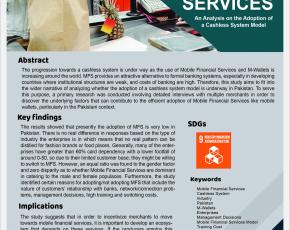Abstract
The progression towards a cashless system is under way as the use of Mobile Financial Services and M-Wallets is increasing around the world. MFS provides an attractive alternative to formal banking systems, especially in developing countries where institutional structures are weak, and costs of banking are high. Therefore, this study aims to fit into the wider narrative of analyzing whether the adoption of a cashless system model is underway in Pakistan. To serve this purpose, a primary research was conducted involving detailed interviews with multiple merchants in order to discover the underlying factors that can contribute to the efficient adoption of Mobile Financial Services like mobile wallets, particularly in the Pakistani context.
Key findings
The results showed that presently the adoption of MFS is very low in Pakistan. There is no real difference in responses based on the type of industry the enterprise is in which means that no real pattern can be distilled for fashion brands or food places. Generally, many of the enterprises have greater than 60% card dependency with a lower footfall of around 0-50, so due to their limited customer base; they might be willing to switch to MFS. However, an equal ratio was found to the gender factor and zero disparity as to whether Mobile Financial Services are dominant in catering to the male and female populaces. Furthermore, the study identified certain reasons for adopting/not adopting MFS that include the nature of customers’ relationship with banks, network/connection problems, management decisions, high training and switching costs.
Implications
The study suggests that in order to incentivize merchants to move towards mobile financial services, it is important to develop an ecosystem that depends on these services. If the producers employ this system and the customers also demand it, then merchants would also have to move towards this side. Therefore, mobile service providers need to simultaneously target all the elements in the value chain in order to make this MFS model more attractive for each player.














